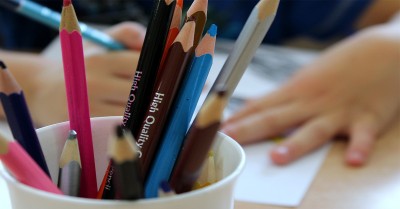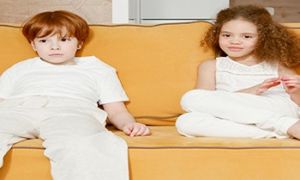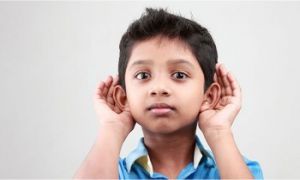For children in the Preschool room, it's an exciting year ahead as they being their transition to big school. During the year, preschoolers will be involved in a variety of shared experiences that enables them to develop a variety of skills in preparation for school.
Developing Skills
The following lists skills in each developmental learning area that supports a child's preparation for school. These can be used to guide your program in determining suitable experiences for each individual child based on their stage of development. The list of developmental skills is an essential part of a child's short and long term success when starting school.
As you prepare children to be ready for their journey from child care and into school programs, it's important to focus equally on all aspects of development — cognitive, physical, and social-emotional. This approach gives children their best chance for healthy, happy, successful lives.
Cognitive Skills
Children must understand not only what to learn but also how to learn. Children need to observe; ask questions; notice similarities, differences, and patterns; and solve problems, all aspects of critical thinking.
- show curiosity and interest in learning new things.
- have the confidence to learn.
- be interested and show a willingness to solve problems.
- finishes task.
- alert and interested.
- recognises and names, colours and shapes correctly.
- numeracy skills developing (i.e. one-to-one correspondence).
- mathematical concepts developing (i.e. weight, size). Sequencing, matching and sorting developed.
- remembers events.
Language Skills
Children must develop vocabulary, listen and communicate effectively, and view reading and writing as pleasurable and important ways to share ideas and gain knowledge.
- ask questions and communicate thoughts and ideas.
- listen to others.
- enjoy listening to stories and being read to.
- can remember and follow directions/instructions. Understands the meaning of verbal expressions.
- has a developed wide vocabulary.
- listens to stories.
- speaks in grammatically correct, expanded sentences. Expresses ideas fluently.
- contributes to discussions (i.e. news).
- articulation is appropriate.
- sufficient volume to be heard when speaking.
- can ask for help and/or ask questions.
Social and Emotional Skills
Children are gently guided and encouraged as they gain confidence and learn to collaborate, communicate, and resolve conflict with each other.
- participate in play.
- approach children in a positive way and make new friends.
- show an interest in others and make friends.
- express individual needs and wants.
- cope and deal with conflict in an appropriate manner.
- express emotions.
- take turns and sharing.
- follow and understand directions and rules.
- cope with transitions.
- has developed positive peer relationships.
- ability to work alone and also in a group.
- relates to other adults other than parents.
- has positive social personality
- displays emotional security.
- appears to have a positive self image.
- can cope with minor frustrations/disappointments.
- remains happy and content during most of the day.
- can accept guidance or direction from adults.
- separates happily from parents.
Self Help Skills
Self-help skills enable children to meet his own needs and involve activities and behaviours that eventually lead to independence.
- use the toilet unassisted.
- dress and undress, independently.
- deal with small amounts of supervision.
- unpack own lunch box and drink from a drink bottle.
- deal with a structured environment.
- can tend to own needs.
- recognise own belongings.
- toilet self independently.
- dress self
Physical Skills
Physical development involves developing control over the body, particularly muscles and physical coordination.
- run, jump and balance.
- use equipment such as balls and climbing equipment.
- use pencils, crayons, textas, glue and scissors.
- ball control.
- confidently run, skip, climb and jump.
- confidently balance and walk a beam using alternative feet.
- a dominant foot that coincides with the dominant hand.
- established a dominant hand preference and grip.
- correct grip and use of scissors.
- detailed and recognisable drawings with attention to detail. Developed and accurate hand-eye coordination.
It is not necessary for a child to develop ALL these skills in order to be "ready for school". These skills can be used to guide a variety of experiences and to support each child in their effective transition to a school environment.
It's important to recognise that the experiences you already provide within the environment such as the conversations you have with children, the songs you sing, the books you read, everyday routines you are already supporting preschoolers in preparing for school.



 Open ended questions cannot be responded to with one word answers such as yes or no. These types of questions enables a child to provide
Open ended questions cannot be responded to with one word answers such as yes or no. These types of questions enables a child to provide During your child’s preschool years, an important milestone begins to emerge. This is the development of pre-writing skills. Pre-writing skills are used to encourage, develop
During your child’s preschool years, an important milestone begins to emerge. This is the development of pre-writing skills. Pre-writing skills are used to encourage, develop Open ended materials enables children to play freely. They are objects that have no rules to follow, use or function. Raw materials that can be
Open ended materials enables children to play freely. They are objects that have no rules to follow, use or function. Raw materials that can be An Acknowledgment of the Country is a way of showing respect for the Traditional Owners and can be given by both non-Indigenous people and Aboriginal
An Acknowledgment of the Country is a way of showing respect for the Traditional Owners and can be given by both non-Indigenous people and Aboriginal Language plays an important role in a child’s development. It enables a child to communicate effectively with their family, learn at school, socialize with friends,
Language plays an important role in a child’s development. It enables a child to communicate effectively with their family, learn at school, socialize with friends, Like adults, children have to deal with their own stress in life. Moving house, starting a new school, preparing for a new sibling - these are
Like adults, children have to deal with their own stress in life. Moving house, starting a new school, preparing for a new sibling - these are Playdough is such a versatile material. It provides numerous benefits to children as they manipulate it, it is safe and soothing and provides children with
Playdough is such a versatile material. It provides numerous benefits to children as they manipulate it, it is safe and soothing and provides children with Teaching children about sustainability enables them to appreciate and respect the natural environment. Early childhood services can provide meaningful hand on learning experiences in order
Teaching children about sustainability enables them to appreciate and respect the natural environment. Early childhood services can provide meaningful hand on learning experiences in order Recycling is an important concept that teaches children to care for the environment. It encourages children to be responsible and show a growing appreciating for
Recycling is an important concept that teaches children to care for the environment. It encourages children to be responsible and show a growing appreciating for When children apply paint to paper, glue things together, or pound a lump of clay, they experiment with colour, shape design and texture.
When children apply paint to paper, glue things together, or pound a lump of clay, they experiment with colour, shape design and texture.



